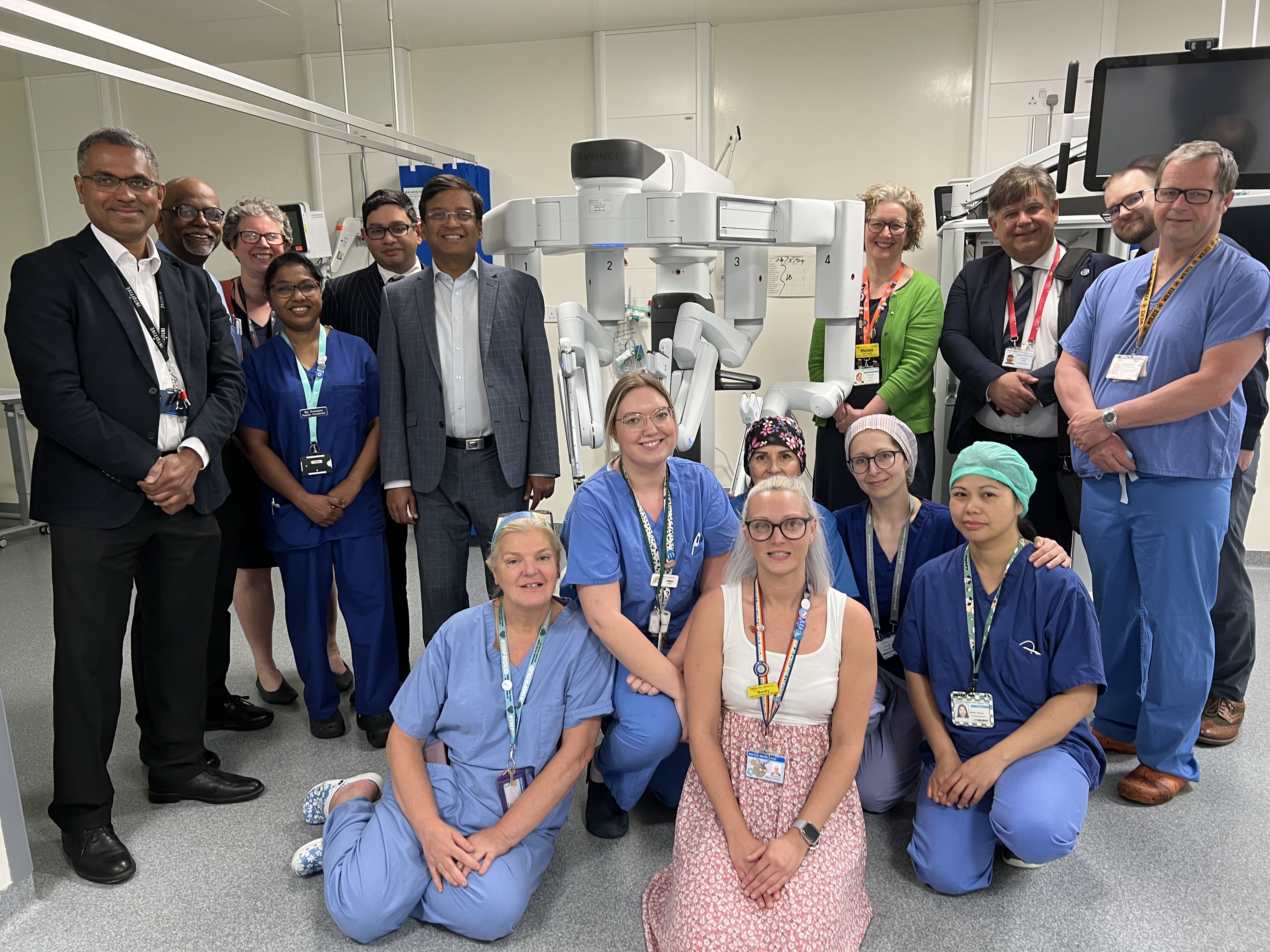State-of-the-art surgical robotic system reaches 1,000 colorectal cancer patient milestone
More than 1,000 patients with bowel cancer have now benefitted from even more precise colorectal cancer surgery thanks to a state-of-the-art robotic system at University Hospitals of North Midlands NHS Trust (UHNM).
The Intuitive Da Vinci Xi dual console robotic system allows surgeons at UHNM to perform complex keyhole operations with greater precision leading to less blood-loss during the procedure, less post-operative pain, a quicker recovery time and a shorter stay in hospital.
Eight colorectal surgeons have been trained to use the robotic system, running five patient lists a week, putting UHNM in the top five centres in the country in a latest bowel cancer audit.
Mr Philip Varghese is consultant colorectal surgeon and lead for colorectal robotic surgery programme at UHNM and is involved in training colorectal surgeons both nationally and internationally.
Mr Varghese said: “This state-of-the-art system helps us to take patient care to the next level at UHNM. Reflecting on our robotic colorectal cancer programme since its start in 2017, I am delighted that so many of our patients requiring colorectal cancer surgery have benefitted from the outstanding care made possible thanks to the robotic system. I’m proud of the way we’ve managed to increase cases year on year and our surgeons have embraced the technology.
“The da Vinci Xi robotic system provides a highly magnified 3DHD vision with true depth perception, allowing our surgeons to have an immersive experience able to see tissue planes clearly, identify structures and stay oriented in the anatomy.”
The imaging system used in conjunction with a dye enables surgeons to do real-time visualisation of blood flow, vessels, tissue perfusion and mapping of lymph nodes by switching between standard visible light and near-infrared imaging. The technological advances have enabled surgeons to perform complex multi organ and nerve sparing surgery.
UHNM is one of the leading centres in the UK with expertise in offering robotic surgical procedures. Since the launch of the robotic programme in 2014, almost 2,500 major robotic surgical procedures have been undertaken by surgeons in urology, colorectal and gynaecology.
Mr Varghese added: “We currently have eight colorectal surgeons fully trained in undertaking robotic surgical procedures. Our aspiration is to become a leading robotic colorectal unit nationally with all 13 colorectal surgeons fully trained in using the advanced minimally invasive Da Vinci robotic surgery platform. We are passionate in training the next generation of robotic surgeons.”
UHNM's robotic colorectal unit will be soon be starting robotic training for colorectal trainees under Health Education England (HEE) West Midlands.
The integrated SimNow robotic simulation system with 47 skills exercises and over 30 procedure simulations provides surgeons with specialised content to support their learning over time. The dual console also enables training of surgeons and higher surgical trainees which then facilitates joint operating for complex procedures.
The robotic system was funded by the Denise Coates Foundation as part of their support for the development of the Trust's cancer services which has been delivered via an £8.4 million grant to UHNM Charity.
James Chadwick was one of the patients to benefit from robot surgery after being diagnosed with a bowel tumour.
The 46-year-old from Newcastle-under-Lyme said: “I was diagnosed with an advanced-sized tumour in the rectum and surrounding organs. Mr Varghese was appointed as my surgeon. He explained that the size of the tumour was too large to safely operate on, and it would need adjuvant chemotherapy and radiotherapy to try and shrink it in size. Fortunately, the tumour did shrink, and Mr Varghese was able to perform multi organ resection surgery using the robot.
“Not having had any form of major surgery before and being apprehensive about the thought of the procedure, I was nervous about it at the time. But Mr Varghese put me at ease and explained the whole process and the benefits of doing the procedure robotically and how it would all work.
“It was amazing that the only scarring was a couple of little buttonholes where the robotic arms had gone into my torso. From expecting to be out of action for a considerable length of time, having the procedure in the October 2023, I was out hiking in the Lake District before Christmas. I was amazed at how quickly I could get back to running a normal life and back to work.
“Given where I was and the prognosis from the oncologist, I can quite happily say thanks to Mr Varghese and the team at UHNM, I’m still about to see my kids grow up. Everybody made me feel at ease even though I was seriously ill, and I’ve always felt completely comfortable in Mr Varghese’s hands both before and after surgery.”
Mr Achilleas Tsiamis, Consultant Colorectal Surgeon and Clinical Director for General Surgery at UHNM said: “The Colorectal Unit at UHNM is probably the biggest single site in the country, and having access to this advanced technology allows us to fulfil our target for offering the best possible cancer care for the people of Staffordshire and beyond.”
Helen Ashley, Director of Strategy and Transformation and Deputy Chief Executive at UHNM said: “It’s amazing that the da Vinci robot has enabled UHNM to achieve 1,000 colorectal cancer patient cases, and I would like to thank and congratulate all involved. This is fantastic news for our patients as we now have shorter waiting times, quicker procedures, fewer complications, and shorter length of stay.”

